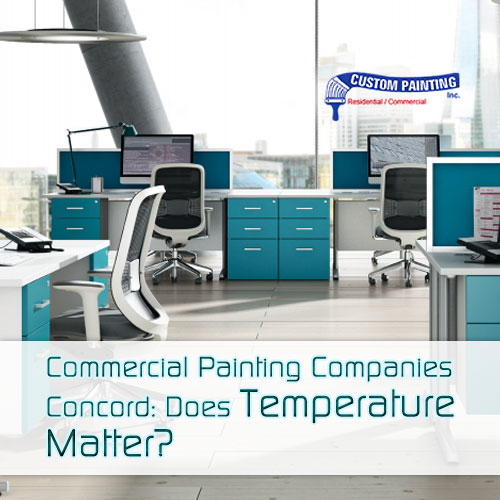Does temperature really matter for commercial painting companies Concord? When you think of professional painters, you may assume that they can easily tackle any paint job no matter the weather and the temperature.
But the truth is quite the opposite. Temperature does matter for most professional painters; no matter how extensively trained these professional painters are, there are times that they cannot paint due to extreme temperatures. They depend on good weather to paint surfaces successfully, and this is true especially when exterior painting.
Here are the general rules of thumb when painting exterior surfaces (and for drying and curing paint):
- Latex (water-based) paints require temperatures of 45 to 90 degrees Fahrenheit (or 7 to 32 degrees Celsius).
- Oil-based paints require temperatures of 50 to 85 degrees Fahrenheit (or 10 to 29 degrees Celsius).
When you apply paint in a temperature that’s too cold, it will prevent proper drying of paint altogether. Moreover, the paint will thicken. Curing under freezing temperatures will cause the paint to retain moisture, which will crystallize in turn. That’s why it’s important that air temperatures do not go below the freezing mark during the first night after the paint has been applied. By that time, the paint will have been cured properly.
Alternatively, when you paint under extremely hot temperatures, the topcoat may dry quickly – but too quickly as it doesn’t allow time for proper curing. It will also cause eventual surface problems such as blistering or “alligatoring” (patterned cracking of hard paint). Paint brushes and rollers will also dry too quickly and become hardened, and thus will be more difficult to use when applying paint.
Extreme fluctuations in temperature should also be considered. Paints usually experience curing and drying problems when temperatures change excessively from high during the daytime and then suddenly drop extremely low during the evening. That’s why it’s best to go out and paint during late summer or early autumn since there’s the least likelihood of extreme temperature changes to happen during this period.
Apart from the right temperature, the right humidity is also a big factor for a successful paint job. The lower the humidity, the lesser chance of moisture in the air to occur, and that makes for ideal conditions for applying paint.
When you paint in high humidity, it will take longer for the topcoat to evaporate because of the high moisture in the air. Plus, the paint’s protective properties will be compromised. Therefore, it is not advisable to paint while the surface is still wet, as moisture will cause the water to be introduced into the paint film which hasn’t yet completely dried. Plus, dust and dirt can stick to the wet paint which results in a dirty paint finish, and you don’t want that.
Professional commercial painting companies Concord do rely on good weather and temperatures for a successful painting job. Plan when you want them to paint the exteriors of your building. It’s better to wait until the weather conditions are optimal for exterior painting.

